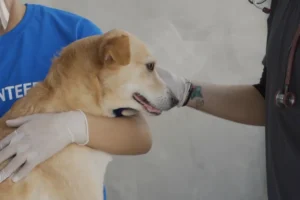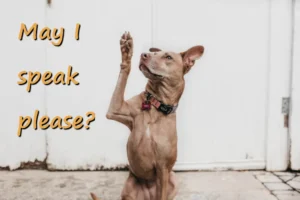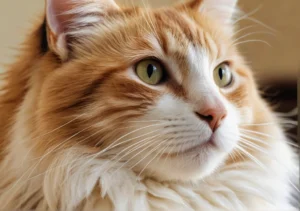Have you ever caught your dog indulging in a not-so-appetizing snack that leaves you scratching your head in bewilderment? Many dog owners have experienced the perplexing behavior of their beloved pets consuming cat feces. But why do dogs eat cats’ poop? Let’s explore this puzzling phenomenon in more detail.
Many dogs display a bizarre habit of eating cat poop, a behavior known as coprophagia. The simple answer to this perplexing question lies in a dog’s innate curiosity and scavenging instincts.
Canine Curiosity: The Driving Force Behind this Behavior
Dogs are natural explorers, always eager to investigate their surroundings. This innate curiosity can lead them to some questionable behaviors, including eating cat poop. From a dog’s perspective, a cat’s litter box is like a mystery treasure trove waiting to be discovered. The enticing smell and texture of cat feces can be irresistible to our canine companions. It’s like a forbidden treat that they just can’t resist.
In addition to their curiosity, dogs also have instinctual behaviors that drive them to consume cat feces. In the wild, dogs may eat feces to keep their surroundings clean and prevent the spread of disease. While this behavior may seem distasteful to us, it’s a natural instinct for dogs to clean up after themselves and their pack.
So, next time you catch your dog indulging in a snack from the litter box, remember that it’s their inquisitive nature and primal instincts at play. It’s not a reflection of their diet or health; it’s just a quirk of being a dog.
Nutritional Deficiencies: Seeking Missing Nutrients
While it may seem gross to us, dogs eating cat poop could be a sign of something lacking in their diet. Dogs are known to be opportunistic eaters, and if they’re not getting all the nutrients they need from their regular meals, they may turn to cat feces to supplement their diet.
If your dog is eating cat poop regularly, it might be worth examining their diet to ensure they’re getting all the essential nutrients they need. Adding a high-quality dog food or supplements recommended by your veterinarian can help address any deficiencies that may be driving this behavior.
Remember, a healthy and balanced diet is key to keeping your furry friend happy and satisfied. By meeting all of your dog’s nutritional needs, you can help curb their cravings for cat feces and keep them healthy and thriving.
Scent Attraction: The Allure of Feline Waste
Dogs’ propensity to eat cat poop can be attributed to their strong sense of smell. Feline feces contains pheromones that are incredibly appealing to dogs. These pheromones are the same ones that cats use to mark their territory, so when a dog smells them in the cat’s waste, it triggers a natural instinct to investigate and even consume it. In essence, dogs are drawn to the scent of cat poop due to these powerful chemical signals that tell them there’s something of interest to explore.
Additionally, dogs have a unique ability to detect subtle scents that humans can’t even perceive, making them especially attracted to the scent of cat feces. This heightened olfactory sense, combined with the alluring pheromones present in cat waste, makes it challenging for dogs to resist the temptation of indulging in a fecal feast.
Behavioral Issues: Compulsive Behavior in Dogs
Apart from the olfactory appeal, dogs may also eat cat poop due to behavioral issues. When dogs exhibit compulsive behaviors like coprophagia (eating feces), it can be a sign of underlying stress, anxiety, or boredom. Dogs may engage in this behavior as a way to cope with their emotions or to seek attention.
To address compulsive behavior in dogs, it’s essential to provide ample mental and physical stimulation. Regular exercise, interactive toys, and positive reinforcement training can help redirect your dog’s focus away from eating cat poop and towards more appropriate behaviors. Additionally, seeking guidance from a veterinarian or animal behaviorist can offer valuable insights into managing and mitigating compulsive tendencies in dogs. By addressing the root causes of behavioral issues, you can help your dog lead a healthier and more fulfilling life.
Preventative Measures: How to Discourage this Behavior
If you’ve caught your dog sneaking a snack from the cat’s litter box, don’t worry – you’re not alone in this paw-some predicament! There are a few simple steps you can take to discourage this less than appetizing habit.
Keep the Litter Box Out of Reach : Place the litter box in a location that is inaccessible to your furry friend. Consider using a baby gate or enclosed litter box to prevent your dog from indulging in the cat’s bathroom buffet.
Regularly Clean the Litter Box : Cats are notorious for their cleanliness, so make sure to scoop the litter box daily. A clean box is less tempting for your dog to explore.
Provide Nutritious Meals : Make sure your dog is getting a well-balanced diet to reduce the likelihood of them seeking out other, less desirable snacks.
Positive Reinforcement : Offer praise and treats when your dog shows disinterest in the litter box. Positive reinforcement can help reinforce good behavior.
Supervision and Training : If your dog continues to go for the litter box, consider crate training or using a command like “leave it” to redirect their attention.
Health Risks: Potential Dangers of Consuming Cat Feces
While dogs may find cat poop to be a tasty treat, there are significant health risks associated with this behavior that every pet owner should be aware of.
Parasite Exposure : Cat feces can contain harmful parasites like Toxoplasma gondii, which can be transmitted to dogs through consumption. These parasites can cause a variety of health issues in dogs, including gastrointestinal problems and even more severe illnesses.
Gastrointestinal Issues : Eating cat poop can lead to upset stomach, vomiting, and diarrhea in dogs. The litter itself can also cause blockages in the digestive tract, which may require medical intervention.
Toxicity : Some cat litter may contain chemicals or substances that are toxic to dogs if ingested. This can lead to poisoning and potentially life-threatening complications.
It’s essential to monitor your dog’s behavior and take steps to prevent them from snacking on cat feces to safeguard their health and well-being. If you notice any concerning symptoms after your dog has consumed cat poop, contact your veterinarian immediately for guidance.
Training Techniques: Teaching Dogs to Avoid Cat Feces
If your dog has a taste for cat poop, don’t worry – there are ways to help them kick this unsavory habit. One effective method is positive reinforcement. When your dog avoids cat feces, praise them and offer a tasty treat as a reward. This helps them associate good behavior with a positive outcome. Creating barriers between your dog and the litter box can also be helpful. Consider using baby gates or placing the litter box in an area that’s off-limits to your pup. Additionally, teaching a strong ‘leave it’ command can be invaluable. This way, you can redirect their attention when they get too close to the litter box. Remember, patience and consistency are key when training your dog to avoid cat feces.
Interesting Fact or Trivia: The Evolutionary Origins of Coprophagia
Did you know that the behavior of eating feces, known as coprophagia, might have evolutionary origins in dogs? Back when dogs were wild hunters, eating feces helped them clean their den and eliminate odors that could attract predators. It also provided them with additional nutrients that may have been lacking in their diet. While this behavior may seem unpleasant to us, it was a survival mechanism for dogs in the wild. So the next time your pup goes for a snack in the litter box, remember that it’s not just about the taste – it’s a behavior ingrained in their DNA.
Unique Section: Surprising Benefits of Coprophagia in the Animal Kingdom
In the wild, some animals engage in coprophagia, which is the act of consuming feces. While this behavior may seem unappealing to us, it actually serves some important purposes in the animal kingdom. One surprising benefit of coprophagia is that it allows animals to gain essential nutrients that may have been missed during the initial digestion process. For example, some herbivores like rabbits eat their own feces as a way to extract more nutrients from their food. This behavior helps them maximize their nutrient intake and maintain their overall health in the wild.
Additionally, coprophagia can also play a role in maintaining the balance of the ecosystem. By consuming feces, some animals help eliminate waste from their environment, reducing the risk of disease spread and keeping their habitats clean. This behavior highlights how animals have adapted unique strategies to survive and thrive in their natural environments, showcasing the fascinating diversity of nature.
Furthermore, some animals use coprophagia as a way to transmit beneficial bacteria to their offspring. For example, certain species of rodents consume feces to inoculate their young with essential gut flora, helping them develop a healthy digestive system. This transmission of beneficial bacteria through coprophagia is crucial for the survival and well-being of the offspring, emphasizing the complex and intricate relationships present in the animal kingdom.
In conclusion, while coprophagia may seem strange to us, it serves important functions in the animal kingdom, highlighting the incredible adaptability and resourcefulness of different species in their natural habitats.
Why Do Dogs Eat Cats Poop?
Dogs often exhibit the behavior of eating cat poop, known as coprophagia, for various reasons. One common explanation is that dogs are attracted to the smell and taste of cat feces, which can contain undigested nutrients that dogs find appealing. Additionally, dogs may engage in coprophagia due to boredom, stress, or anxiety, seeking out the scent and texture of cat poop as a form of entertainment or comfort.
Another factor that contributes to this behavior is the natural instinct of dogs to scavenge for food. In the wild, dogs would consume feces as a way to obtain additional nutrients or to prevent the spread of parasites. This innate scavenging behavior can manifest in domesticated dogs eating cat poop, as they are drawn to the scent and texture of feces.
Moreover, dogs may also eat cat poop as a way to assert dominance or establish social hierarchies within a multi-pet household. By consuming the feces of other animals, dogs may be signaling their status and territorial boundaries. This behavior can be influenced by the dynamics between pets in a shared environment, leading to instances of coprophagia among dogs and cats.
Overall, the behavior of dogs eating cat poop can be influenced by a combination of factors, including taste preferences, scavenging instincts, boredom, and social dynamics. Understanding these reasons can help pet owners address and manage coprophagia in their dogs with appropriate training and environmental enrichment.
- Keep cat litter boxes clean and out of reach to prevent dogs from accessing cat poop.
- Provide mental stimulation and physical exercise for dogs to combat boredom and stress.
- Consult with a veterinarian to rule out any underlying health issues that may be contributing to coprophagia behavior.
- Consistently reinforce positive behaviors and discourage scavenging habits through training and redirection techniques.
Alex, a passionate animal lover, has experience in training and understanding animal behavior. As a proud pet parent to two dogs and three cats, he founded AnimalReport.net to share insights from animal experts and expand his knowledge of the animal kingdom.




